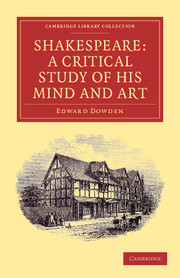Book contents
- Frontmatter
- PREFACE
- Contents
- CHAPTER I SHAKSPERE AND THE ELIZABETHAN AGE
- CHAPTER II THE GROWTH OF SHAKSPERE'S MIND AND ART
- CHAPTER III THE FIRST, AND THE SECOND TRAGEDY; ROMEO AND JULIET; HAMLET
- CHAPTER IV THE ENGLISH HISTORICAL PLAYS
- CHAPTER V OTHELLO: MACBETH: LEAR
- CHAPTER VI THE ROMAN PLAYS
- CHAPTER VII THE HUMOUR OF SHAKSPERE
- CHAPTER VIII SHAKSPERE'S LAST PLAYS
CHAPTER IV - THE ENGLISH HISTORICAL PLAYS
Published online by Cambridge University Press: 29 August 2010
- Frontmatter
- PREFACE
- Contents
- CHAPTER I SHAKSPERE AND THE ELIZABETHAN AGE
- CHAPTER II THE GROWTH OF SHAKSPERE'S MIND AND ART
- CHAPTER III THE FIRST, AND THE SECOND TRAGEDY; ROMEO AND JULIET; HAMLET
- CHAPTER IV THE ENGLISH HISTORICAL PLAYS
- CHAPTER V OTHELLO: MACBETH: LEAR
- CHAPTER VI THE ROMAN PLAYS
- CHAPTER VII THE HUMOUR OF SHAKSPERE
- CHAPTER VIII SHAKSPERE'S LAST PLAYS
Summary
The historical plays of Shakspere may be approached from many sides. It would be interesting to endeavour to ascertain from them what was Shakspere's political creed. It would be interesting to compare his method as artist when handling historical matter with that of some other great dramatist,—with that of Schiller when writing “Wallenstein,” or Goethe when writing “Egmont,” or Victor Hugo when writing “Cromwell.” Shakspere's opinions, however, and Shakspere's method as artist are less than Shakspere himself. It is the man we are still seeking to discover—behind his works, behind his opinions, behind his artistic process. Shakspere's life, we must believe, ran on below his art, and was to himself of deeper import than his work as artist. Not perhaps his material life, though to this also he contrived to make his art contribute, but the life of his inmost being. To him art was not, as it has been to some poets and painters and musicians, a temple-worship; a devotion of self, a surrender which is at once blissful and pathetic to some presence greater and nobler than oneself. Of such pathos we discover none in Shakspere's life. He possessed his art, and was not possessed by it. With him poetry was not, as it was with Keats, or as it was with Shelley, a passion from which deliverance was impossible.
- Type
- Chapter
- Information
- Shakespeare: A Critical Study of his Mind and Art , pp. 162 - 221Publisher: Cambridge University PressPrint publication year: 2009First published in: 1875

